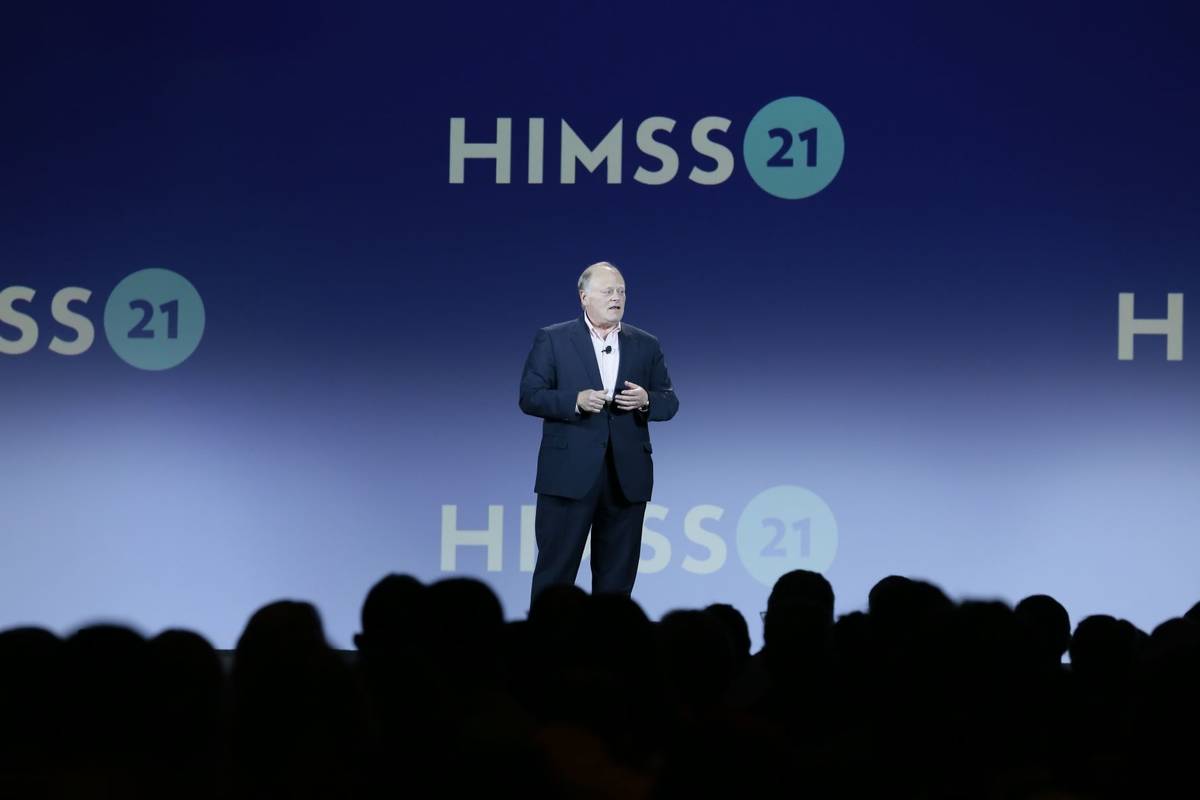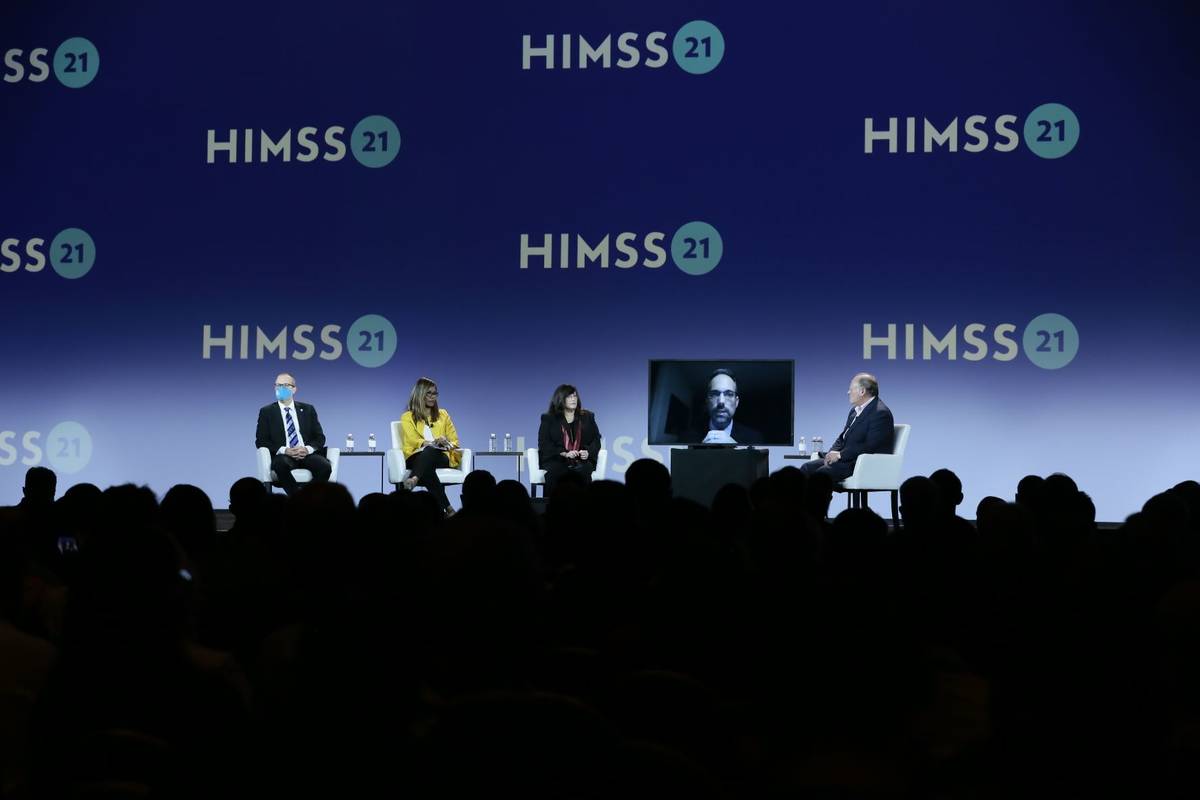Panelists share early lessons from pandemic at Las Vegas conference
Public health leaders from across the globe reflected on lessons learned so far in the COVID-19 pandemic during a global health conference Monday, as the rising prevalence of the delta variant caused more infections and reminded leaders the health crisis is not yet over.
The opening keynote panel of the HIMSS Global Health Conference & Exhibition, held at The Venetian’s Palazzo Ballroom, focused on strengths and weaknesses in global health systems. Panelists’ credentials ranged from acting assistant secretary of defense for health affairs in the Department of Defense to the leadership in the World Health Organization.
Officials were aware the keynote’s topic, “Preserving the Health of a Population — Early Lessons from a Global Pandemic,” had a note of irony as the delta variant makes waves throughout the world.
Hans Kluge, the World Health Organization’s regional director for Europe, highlighted how the pandemic’s effects could continue to resurface if the virus is not addressed everywhere.
“If people are asking themselves why to help other countries when we first have to help ourselves, I say no one is safe until everyone is safe,” Kluge said. “If solidarity is not there from the heart, it has to come from the brain.”
The issue can be seen in the Middle East, where Israel was applauded this year for its successful vaccine rollout and quick return to pre-pandemic life.
Ran Balicer, an executive at Israel’s largest health care organization, Clalit Health Services, said the country thought it was in the clear earlier this summer when the seven-day average of new infections was down to double-digits. The country is now seeing exponential growth in daily cases.
“It is again evident that this disease, this challenge, this pandemic, is an ever-changing and continuous challenge that we’ll have to go for a little while longer at the very least,” Balicer said while tele-conferencing into the panel.
Panelists found there was plenty to learn from the past 18 months. Leaders should prioritize population health, equity and social determinants of health and mental health, they said.
“We saw the huge health inequities throughout, and we saw communities that needed access to testing (and) early access to vaccines not be able to get that,” said Patrice Harris, former president of the American Medical Association. “So certainly, there are lots of issues that have been amplified, but I believe that you can’t solve a problem that you can’t identify. Now that we know, we have to make sure there are sustained efforts to continue to do work at all of those areas.”
Vaccination requirement
Unique about this year’s Healthcare Information and Management Systems Society conference was a “vaccination required” policy for all attendees, exhibitors and staff. Masks were also required because of the state’s mandate for high-transmission areas.
Despite significant mitigation measures, some major companies pulled out of the conference. Medicomp Systems, for instance, announced it canceled its participation about two weeks before because of the surging delta variant. In Clark County, the positivity rate is about 16.3 percent, and the two-week moving average of new daily cases is 981 as of Monday.
The trade show and conference for the digital and health tech industry still brought close to 700 booths and 18,000 in-person attendees, a HIMSS spokeswoman said — the largest of its kind in the U.S. Pre-pandemic conferences have brought about 47,000 participants to convention centers in Las Vegas and Orlando, Florida.
“Our goal is to host a safe and meaningful conference,” Karen Groppe, senior director of strategic communications, said in a statement. “HIMSS has adopted a ‘Vaccination Required’ approach for all attendees, exhibitors and HIMSS staff at HIMSS21. In practice, this means all HIMSS21 attendees, exhibitors and HIMSS staff will have to provide proof of their COVID-19 ‘full vaccination’ in order to gain access to the HIMSS21 campus. We decided this was the best route to host a safe event.”
Guarded optimism
Kluge, of the WHO, said countries that handled the pandemic well had a strong primary health care system and integrated public health functions.
What should be kept in mind, Kluge said, is the connection between global health and strong economic output.
“We finally get this shift in thinking that there is no contradiction between life and livelihoods, between health and economy,” he said. “I think that’s one of the biggest lessons, no health, no economy.”
Panelists shared guarded optimism for the future of the COVID-19 pandemic, encouraged by the successful global portfolio of vaccines. Pushing through the pandemic will require scaling up the vaccination campaign, keeping pressure on the virus while avoiding lockdowns and expanding on treatment therapies.
They said health data and information technology will be instrumental in pushing forward by using data to understand and equitably respond to an outbreak.
“You really need the data in real time to understand what is coming and to respond in time because your impact is always delayed,” Balicer said. “There’s an embedded delay in the situation that makes it exceedingly difficult for decision makers.”
HIMSS is hosting its conference through Friday at The Venetian and Sands Expo and Convention Center, Caesars Forum Conference Center and Wynn Las Vegas.
The Review-Journal is owned by the family of Dr. Miriam Adelson, the majority shareholder of Las Vegas Sands Corp. Las Vegas Sands operates The Venetian and the Sands Expo and Convention Center.
McKenna Ross is a corps member with Report for America, a national service program that places journalists into local newsrooms. Contact her at mross@reviewjournal.com. Follow @mckenna_ross_ on Twitter.











































